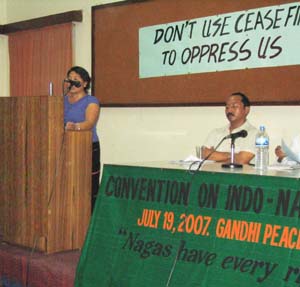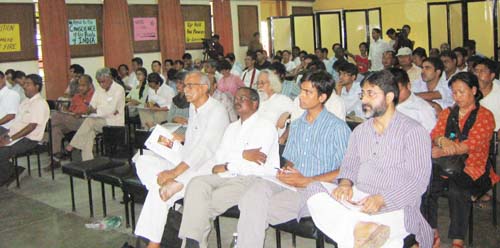
Archive 2009
|
August 1-15, 2007
Convention on Indo-Naga political dialogue Activists of different communist parties and groups as well as activists of the human rights movement, and activists from the different movements in Kashmir and the North East participated in a Convention on Indo-Naga Political Dialogue held on July 19 in Delhi. The Convention was organized against the backdrop of the mounting tension and uncertainty amongst the Naga people and other peoples, given that the current state of ceasefire is scheduled to end on July 31, 2007. Even while a fresh round of negotiations between the Government of India and the Nagas are scheduled to begin on July 20, there is worry whether the government of India is serious about addressing the long standing concerns of the Naga people. The Convention was organised by the Naga Hoho, Naga Mothers Association, Naga Students' Federation and Naga Peoples Movement for Human Rights (NPHMR). It was chaired by Surendra Mohan, former Member of Parliament, and co chaired by Mr Elias Loth from the NPHMR. Folowing introductory remarks by Dr N. Venuh, Secretary General of the NPMHR, Mr. Neingulo Krome, General Secretary of the Naga Hoho, made an important presentation on the problems of the Indo-Naga political dialogue as experienced by the people and political forces of Nagaland. Khesheli Chishi, President of Naga Mothers Association made a moving presentation on the plight of women in Nagaland, and the use by the Indian army of rape and torture as political weapons to ensure the submission of Naga society. Imchatoba Imchen, President of the Naga Students Federation, spoke about the concerns of the students and youth. This was followed by a report from a democratic and human rights team that visited Nagaland in June. In their presentations the Naga activists clearly pointed out the double speak and double dealing of the Indian state with the people of Nagaland over the past six decades. India's rulers have had a two faced approach to the Naga peoples struggle in the same manner as the British colonialists had during their rule. Thus Gandhi is supposed to have made statements in support of Naga independence, but this did not prevent Nehru's government from sending the army to crush the Naga people's revolutionary struggle for sovereignty and self determination. The Naga people have never recognized the rule of the Indian state for these past 60 years, and have continued their struggle for self determination without letup. At various times, the government of India has had negotiations with the leadership of the Naga movement, right from 1947 onwards. At other times it has broken off negotiations. These have been dictated not from the interests of addressing the concerns of the Naga people, but to gain temporary advantage for itself. Thus the Indian government began negotiations with the Nagas in 1964, and had a ceasefire, at a time when following the border war with China, the Indian ruling class wanted to secure the North East flank one way or another. Later on in 1972, they broke off the negotiations and once again began the military conflict. This corresponded to the break up of Pakistan and the establishment of Bangladesh and the strengthening of the Indian state's position in the North East. The Indian state has tried to set Naga against Naga and Nagas against Manipuris, and so on. It has pursued a divide and rule policy inherited from the colonialists. It is not an accident that the Indian state has, over this period, tried to divide the united opposition of all the peoples of the North East to the Armed Forces Special Powers Act by nefarious means. It has tried to play different organisations of the Nagas against each other, by sometimes favouring one and sometimes the other. The Indian state has played the divide and rule game between Manipuris and Nagas, by whipping up fears and passions that a negotiated settlement of the Naga question will lead to the territorial division of the present day state of Manipur. All this is being done through the activities of the Indian intelligence agencies and their touts in the movement. The result of these activities is that instead of a united struggle of the peoples of the North East for the reconstitution of India, in which the sovereignty of each people and nation will be guaranteed, there is a danger of the struggles of different nations and peoples getting isolated from each other and being manipulated by the state against the interests of the people. It is extremely important that the people do not fall prey to this. The struggle of the Naga people for sovereignty is an entirely just struggle, and the Naga people have never allowed themselves to be subjugated, either by the British colonialists, or the Indian rulers after independence. The colonialists carried out empire building on the basis of ruthless suppression of the nations and peoples, of the workers, peasants and broad masses of people. They exacerbated caste, religious, regional and ethnic conflicts amongst the peoples. They established a state suited to this purpose in 1858 after crushing the great Ghadar of the Indian people of 1857. In the anti colonial liberation struggle, the peoples of India expressed their aspiration for sovereignty and freedom from all forms of enslavement. However, those who came to power in August 1947 refused to make a break with the colonial legacy. The workers and peasants fought for an India in which independence would be accompanied by deep-going social transformations. They hoped that the imperialist and colonial oppression and exploitation of nations and peoples would be ended with independence, that they would be free to determine their own destiny. These hopes have been belied. India is a prison house of nations and peoples, wherein the big bourgeoisie controlling the central state uses its armed forces to plunder and subjugate the peoples and deprive them of sovereignty. The present Indian Union does not recognise the existence of nations and peoples constituting India. The Indian bourgeoisie's vision is an empire building vision like that of the British colonialists. It is approaching the peoples of the North East in general and the Naga people in particular from the standpoint of how to subjugate them, "pacify" them and open up the North East for intensified plunder as part of its "Look East Policy". The course it is pursuing will only increase the trauma for the peoples of the North East. The Indian Union needs to be reconstituted. It needs to be acknowledged that India consists of numerous nations and peoples. It will be to the benefit of the workers and peasants of every nation and people if all of the nations and peoples were together united in a voluntary union of workers and peasants republics. The revolutionary communists fight with this vision in mind. The union of the peoples and nations will be a powerful bulwark against imperialism and all the forces of reaction. At the same time, the union must be a voluntary one in which each constituent nation and people has the right to self-determination, up to and including separation from the Union. The workers and peasants of the rest of India view the struggle of the Nagas, Manipuris, Kashmiri and other peoples as part of the one, common revolt of the Indian people for a new order, a new system in which the workers and peasants and toiling people of all nations and nationalities will be truly masters of their own destiny. The Indian state of the big bourgeoisie is the common enemy of all of us — its replacement by a voluntary union of workers and peasants republics is the call of the times.
|


